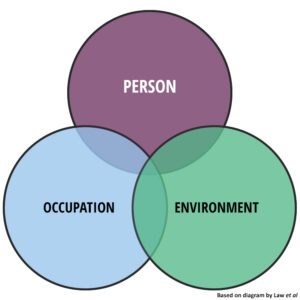An Occupational Therapist’s perspective on Wellbeing at Work
This is part two of a two-part series written by W2W Clinical Health Coaches Dr. Anuska Randolph-Stephens and Kaylie Behan, to read part one, click here.
Work and wellbeing:
How many times do we hear people describe how they are feeling by using the word ‘wellbeing’? Wellbeing is personal and subjective. If we want to understand how someone is doing in terms of their wellbeing, we need to actively listen and work to understand their health and happiness without judgement.
Being an occupational therapist (OT) in the specialist area of work, I hear about the importance of, and sense of, normality that work brings to everyday life. In recent years, there has been a discernible shift of focus in the field of psychology from illness to wellness (Aked et al. 2008). Work is an essential occupation to ensure good health and wellbeing; being in work, staying in work and returning to work are all associated with improved mental and physical health and wellbeing (Royal College of Nursing, 2019).
The ONS (2022) shows that the average ratings of personal well-being in the UK have improved across all indicators; but remain below pre-coronavirus (COVID-19) pandemic levels. Employers can play a leading role in steering the health and wellbeing agenda, but employees also have a responsibility to look after their own health and wellbeing. It is essential to look at wellbeing holistically, with a person-centred approach at the heart. In part 1 of this series, Dr Anuska Randolph-Stephens provides a health psychologist’s perspective on person-centred health and wellness, using an evidence-based approach, namely the biopsychosocial model (Engel, 1977). This framework outlines the importance of nurturing all areas of our life to support good wellbeing.
Wellbeing in work
Part of my professional reasoning skills are based upon an understanding of the inter-relationship between occupation, health and wellbeing. Occupations are everyday tasks and activities that enable people to live a meaningful life and participate in the wider world. Work is one of the many occupations we have in our daily lives and so it’s important to understand how we can best support ourselves to continue to work and stay well.
Occupational therapists are focussed on promoting people’s wellbeing within their occupation (which may or may not be employment). The Person-Environment Model (Law et al., 1996) emphasises that there are transactional relationships between the person, the environment and occupation that can affect occupational performance. OT’s look at the relationships between a person’s everyday activities alongside the challenges they face and their environment. Disruption to these everyday activities is experienced by many people due to illness, disability or other circumstances which can harm our health and wellbeing (Royal College of Occupational Therapists, 2019).

There are many occupations that OTs focus on including:
- Self-care (e.g., getting dressed, eating a meal)
- Productivity (e.g., participating in school, going to work)
- Leisure activities (e.g., socialising with friends, belonging to a group, participating in hobbies)
Self-care: The World Health Organization (2014) defines self-care “the ability of individuals, families and communities to promote and maintain health, prevent disease and to cope with illness” Self-care is something we need to do every day to function and survive. We all have similar self-care occupations, such as drinking, toileting, washing, eating, and sleeping. However, the way in which we do them will all be different to meet our health and wellbeing needs. For example, we all eat, but what we eat, how often and the quantity we eat will all differ based on individual health, ability, religious and personal preferences. Self-care is a very individualised approach that gives us routine, structure, safety and comfort.
Productivity: Productivity refers to an individual’s contributions to society through both paid and unpaid occupations. ‘Good work’ is good for our health, and there are many social, financial, psychological and structural benefits to being at work (Public Health England, 2019). It provides us with a purpose and sense of identity as well as financial independence. There is strong evidence that shows work is generally good for physical and mental health and well-being (Waddell and Burton 2006).
Leisure: Leisure time and occupations may include quiet recreation such as reading, active recreation such as travel, or community outings and socialisation, such as visiting friends and family. These are our social connections, things we enjoy doing and have an interest in. Mind (2023) shows how connecting with others can help us feel close to people, and valued for who we are.
If someone has an illness or impairment that reduces engagement in meaningful occupations, then it is suggested this can impact a person’s identity, sense of wellbeing and ability to continue to work (Kennedy-Behr and Hatchett 2017).
It is important to consider the relationship between work, self-care and leisure. If we became unable to attend to our self-care needs, then we might not be able to get ready for work and function effectively. If we spent too much time at work and didn’t have a work life balance by having time to do the things we enjoy doing, would this start to impact our mental wellbeing and health, would we become stressed, and enjoy work less? These are the sorts of questions that OTs ask to support an individual’s overall health and wellness. They ask the person to consider what it would mean to you if you weren’t able to engage in self-care, a leisure activity or meaningful activity. How would you feel, and what is the impact on your wellbeing?
If you have time now why not get a cuppa and ask those questions for yourself.
- What self-care activity is most important to you every day? How will you ensure you maintain doing it?
- How do you keep productive and engaged? What activities do you enjoy the most?
- What do you do for leisure? For fun? How do you make sure you keep doing these things?
If you’d like to talk to us about wellbeing at work and how we support organisations through our work support services or training programmes, then please do get in touch
References
Aked, J. et al. (2008). A report presented to the Foresight Project on communicating the evidence base for improving people’s well-being. (Accessed: 15/06/2023). Available at: https://neweconomics.org/uploads/files/five-ways-to-wellbeing-1.pdf.
Engel G,L (1977) The need for a new medical model: a challenge for biomedicine. Science. Apr 8;196(4286):129-36. doi: 10.1126/science.847460. PMID: 847460.
Kennedy-Behr, A and Hatchett, M. (2017). Wellbeing and engagement in occupation for people with Parkinson’s disease. British Journal of Occupational Therapy, 80(12), pp.745–751. doi:https://doi.org/10.1177/0308022617728645.
Law, M. et al. (1996). The Person-Environment-Occupation Model: A Transactive Approach to Occupational Performance. Canadian Journal of Occupational Therapy, 63(1), 9–23. https://doi.org/10.1177/000841749606300103
Mind (2023). 5 ways to wellbeing (Accessed: 21/06/2023) Available at: https://www.mind.org.uk/workplace/mental-health-at-work/five-ways-to-wellbeing/
ONS (2022). Personal well-being in the UK – Office for National Statistics (Accessed: 20/06/2023) Available at: https://www.ons.gov.uk/peoplepopulationandcommunity/wellbeing/bulletins/measuringnationalwellbeing/april2021tomarch2022
Public Health England (2019). Guidance – Health Matters: health and work (Accessed on 26/06/2023). Available at: https://www.gov.uk/government/publications/health-matters-health-and-work/health-matters-health-and-work
Royal College of Nursing (RCN) (2019). Healthcare Professionals’ Consensus Statement for Action Statement for Health and Work. (Accessed: 15/06/2023). Available at: https://www.councilforworkandhealth.org.uk/wp-content/uploads/2019/05/Health-and-Work-Consensus-Statement.pdf.
Royal College of Occupational Therapists (2019). What Is Occupational Therapy? OT Explained – RCOT. (Accessed: 20/06/2023). Available at: https://www.rcot.co.uk/about-occupational-therapy/what-is-occupational-therapy.
Waddell, G. and Burton, K. (2006). WELL-BEING? (Accessed: 21/06/2023) Available at: https://assets.publishing.service.gov.uk/government/uploads/system/uploads/attachment_data/file/209510/hwwb-is-work-good-for-you-exec-summ.pdf.
WHO (2014). Self-care can be an effective part of national health systems. (Accessed: 21/06/2023) Available at: https://www.who.int/news/item/02-04-2019-self-care-can-be-an-effective-part-of-national-health-systems
Woodroffe, N. (2022). PEO Model. (Accessed: 21/06/2023) Available at: https://peomodel.com/.


